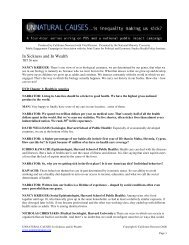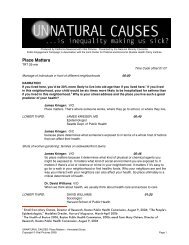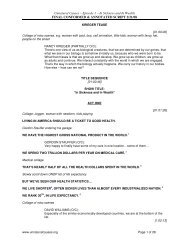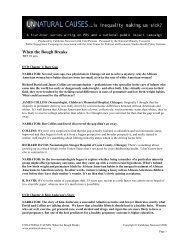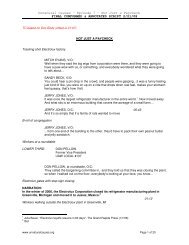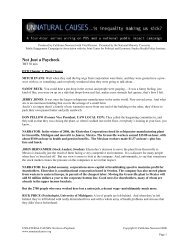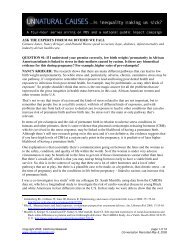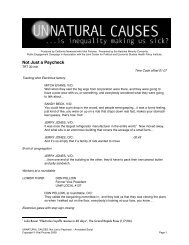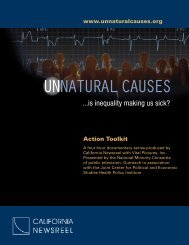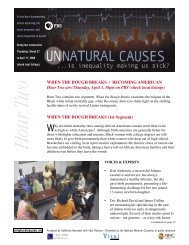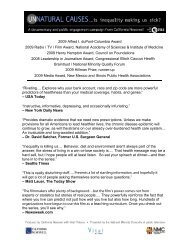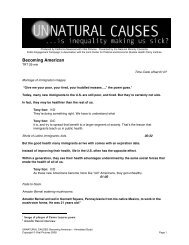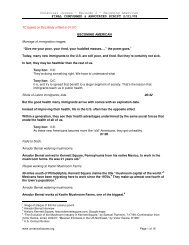Episode Seven: Not Just a Paycheck - Unnatural Causes
Episode Seven: Not Just a Paycheck - Unnatural Causes
Episode Seven: Not Just a Paycheck - Unnatural Causes
Create successful ePaper yourself
Turn your PDF publications into a flip-book with our unique Google optimized e-Paper software.
<strong>Episode</strong> <strong>Seven</strong>: <strong>Not</strong> <strong>Just</strong> a <strong>Paycheck</strong>Th e My s t e ry: When a Swedish-owned company closed manufacturing plants inGreenville, Michigan, and Vastervik, Sweden, why did the health of Greenvilleresidents quickly deteriorate while health outcomes in Vastervik remained steady?Th e m e s:1. Layoffs, unemployment, and job insecurity have a negative effect on health.2. Public policies that provide a social safety net can buffer unemployed workers andtheir families from economic disruptions and uncertainties that affect health.3. Societies that take a “we’re all in this together” approach to policy have better healthoutcomes than those that leave individuals and communities to fend for themselves.Co m p r e h e n s i o n Qu e s t i o n s: Why did Electrolux close its Greenville and Vastervik plants? What was theimpact on workers in each community? How did they cope? Why is unemployment in the U.S. associated with higher rates of stroke, heartand kidney disease, alcohol abuse, suicide, and homicide? How did the caseloadat the local hospital change in the year after the Greenville plant closed? Howmany “excess deaths” does Professor Harvey Brenner predict Greenville will see inthe next 10 years due to the Electrolux shutdown and increase in unemployment? Psychologist Rick Price says: “Involuntary job loss isn’t just something that affectsa particular individual who suddenly has to find a new job, because it ripplesthrough whole families and communities.” Give examples from the film of theripple effect Price describes, for different health outcomes and who is affected. Former Swedish Minister of Industry Thomas Östros says, “Unemploymentis very bad for individuals. You lose your connection to society, you lose yourdemocratic empowerment.” What does he mean? Provide examples from thefilm that illustrate this.• What protections does Sweden provide for its workers that soften theimpact of job loss on individuals and communities? What about the U.S.?• What are some of the other resources and opportunities the Swedishgovernment makes available to everyone – rich or poor – that we don’thave here in the U.S.?• How do Swedes pay for these programs?<strong>Episode</strong> <strong>Episode</strong> <strong>Episode</strong> <strong>Episode</strong> <strong>Episode</strong> <strong>Episode</strong><strong>Episode</strong><strong>Unnatural</strong> <strong>Causes</strong> Discussion Guide © 2008 California Newsreel www.unnaturalcauses.orgpage G1
would it take to make that happen? What kind of changes in law and powermight hold corporations more accountable to stakeholders like communities andemployees? How might such changes impact business practices? What factors go into a company’s decision to shut down a plant and movesomewhere else, especially overseas? Do you know of situations where acorporation threatened to leave or shut down if employees or the local or stategovernment didn’t provide concessions? What effect might such job insecurityhave on the health of workers? In Sweden and many other European countries most workers belong to unionswhich provide workers more power and a bigger say not just on the job but ingovernment decision making. Why has union membership declined in the U.S.?What factors in the U.S. affect the power and effectiveness of unions? How canU.S. workers gain more control over the terms and conditions of their jobs?What about communities? Electrolux moved its Greenville facility to Mexico so that it could cut laborcosts and increase its profit. U.S. workers paid the price. How do we protectcommunities from health threats posed by the chaos and uncertainty of freemarkets? Should corporations be “free” to shift capital anywhere in the worldin search of the highest profit? We’ve imposed many restrictions on corporatefreedom over the years ranging from minimum wage laws to environmentalstandards. Should the movement of capital also be regulated? How? Researcher Richard Price says, “We live in an individualistic society. And webelieve that people are individually and personally responsible for their own fate.We enact our laws that way. We create our social policy that way.”• Do individuals determine their own fate? Should they? Why?• How does this frame of the “self-determining individual” shape theway we view the roles of government or corporations?• How does it impact our ability to work collectively to improveconditions for health?• What other core American values might we draw upon to push fordifferent policies? Economic writer Jared Bernstein distinguishes between YOYO (“You’re onYour Own”) and WITT (“We’re in this together”) societies. What differentiatesthese two types? Why has the U.S. gone down the YOYO society path, unlikeSweden? Who gains and who loses in changing from a YOYO to a WITTsociety? How would strategies for social change be different than trying torepair the damage? How would power have to shift? What does that mean?<strong>Episode</strong> <strong>Episode</strong> <strong>Episode</strong> <strong>Episode</strong> <strong>Episode</strong> <strong>Episode</strong><strong>Episode</strong><strong>Unnatural</strong> <strong>Causes</strong> Discussion Guide © 2008 California Newsreel www.unnaturalcauses.orgpage G3
Su g g e s t e d Ac t i v i t y: Ho u s e h o l d Bu d g e t Ad j u s t m e n t sPart 1In the program, laid-off workers found that unemployment payments or wages from available jobs cuttheir income by at least 50%. Assume that the earners in your household were laid off and your totalhousehold income was reduced by half.1. Consider how these changes would affect:• Where you live• How you get where you need to go• What you typically eat• Your mental health• Your relationship with your partner or children• Your ability to pay off your mortgage and / or other debt• How this would affect “essentials” like Internet connection, cell phone usage• What you might do for entertainment or vacation• Prospects for your children’s future• Your ability to plan for retirement and old age• Your sense of hope for the future2. After you have completed the activity, assess your stress level. Are you feeling more or lessstressed (or anxious) than when you started?Part 2Psychologist Rick Price also reminds us, “Involuntary job loss isn’t just something that affects aparticular individual...it ripples through whole families and communities.”3. Next, consider how these same changes would affect your community as a whole:• property values and home sales• the tax base• upkeep and maintenance of physical spaces• public services, libraries, community programs• schools and senior centers• crime and personal behaviors• business development and investment• sense of optimism and hope4. Draw up a list of recommended social and economic policies that might protect you and yourcommunity from the chaos and uncertainty. Debate the pros and cons of each.<strong>Episode</strong> <strong>Episode</strong> <strong>Episode</strong> <strong>Episode</strong> <strong>Episode</strong> <strong>Episode</strong> <strong>Episode</strong><strong>Unnatural</strong> <strong>Causes</strong> Discussion Guide © 2008 California Newsreel www.unnaturalcauses.orgpage G4
We b Si t e Ti p s:Interactivity: What do healthy countries have in common? Explore YOYO Health tosee how the U.S. compares internationally on key health indicators.Web-Exclusive Video: See how job loss and unemployment affect kids.Ke y Re f e r e n c e s:Brenner, M Harvey. Estimating the Effects of Economic Change on National Health andSocial Well-Being: A Study. A report of the United States Congress Joint EconomicCommittee, Subcommittee on Economic Goals and Intergovernmental Policy, 1984.An excellent source of information on wealth distribution and the income gap isavailable at www.inequality.org.Marmot, Michael, G Davey Smith, S Stansfeld, et al. “Health Inequalities amongBritish Civil Servants: The Whitehall II Study,” Lancet, 1991.Marmot, Michael. The Status Syndrome: How Social Standing Affects Our Health andLongevity. NY: Henry Holt, 2004.Mishel, Lawrence (ed), Jared Bernstein and Sylvia Allegretto. The State of WorkingAmerica 2006/2007. Ithaca, NY: Cornell University Press: 2006.Dr. Richard Price, who is featured in the program, directs The University of MichiganPrevention Research Center. A variety of research papers related to the healthconsequences of unemployment are available for download from the Center’s Web site:www.isr.umich.edu/src/seh/mprc/public.htmlThe United for a Fair Economy Web site (www.faireconomy.org) includes a variety ofresources on economic democracy and justice.From the film:• In 2006, Electrolux workers in Michigan earned $15 an hour plus benefits.Electrolux’s Mexican workers earn $1.57 an hour plus bus fare and lunch.• In 2004, the Greenville hospital treated 80 cases of depression, attempted suicide,and domestic abuse. The year after the plant closing, that number nearly tripled.• Economist Harvey Brenner predicts that the Electrolux closing will resultin 135 “excess deaths” in the Greenville area over 10 years.• In 1965, one-third of the jobs in the U.S. were manufacturing jobs. Today,under 13% of U.S. jobs are manufacturing jobs.• The top 1% of Americans hold more wealth than the bottom 90% combined.• CEOs earn more than 250 times the average worker’s pay.<strong>Episode</strong> <strong>Episode</strong> <strong>Episode</strong> <strong>Episode</strong> <strong>Episode</strong> <strong>Episode</strong> <strong>Episode</strong><strong>Unnatural</strong> <strong>Causes</strong> Discussion Guide © 2008 California Newsreel www.unnaturalcauses.orgpage G5



